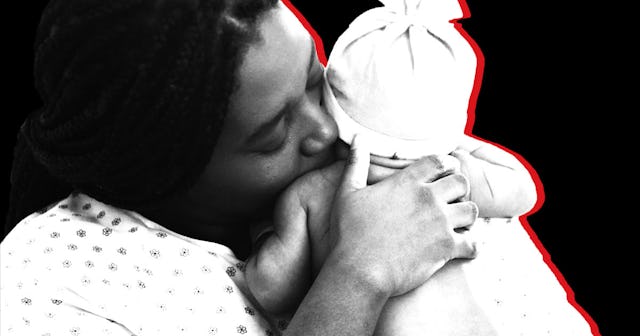Mistreatment During Birth Is Real -- And So Is The Resulting Trauma

It’s scary to give birth in the United States.
Of course, birth isn’t inherently alarming. As a matter of fact, many models, like the Midwives Model Of Care, acknowledge that birth is a natural event. In the hospital setting, however, birth is often treated as a health emergency. That’s not to say that emergencies never happen during birth. But the large gap between the suggested rate of C-sections in comparison to our nation’s C-section rate shows that something isn’t lining up.
In a matter of moments, a birthing mother can shift from normal to high risk and end up in a web of intervention. And interestingly enough, that was my story.
My vitals were great at every appointment I attended. I was gaining weight rapidly, but it didn’t seem to be a source of alarm for my care team. I was informed and believed I was as prepared as one could be, having never given birth.
After nearly 30 weeks of a “normal pregnancy,” I was labeled as “at risk” and treated as such. Suddenly, my voice didn’t matter. Someone dropped the ball and didn’t inform me that my son had a medical condition. They assumed things would improve on their own, and I have reason to believe I wouldn’t have known about the medical condition if I hadn’t questioned a note on my ultrasound order.
KidStock/Getty
I paid for their mistakes by being scheduled for an induction in another state and being held to those inappropriate expectations when I went into labor a few days before my appointment. I was shocked how doubtful everyone was of my own ability to know when I was in active labor and ready to push. Much of the rest was a drug-induced haze.
I remember forceps, receiving an episiotomy (which I was informed of after the fact), and being told I was losing a lot of blood. At the same time, after labor and delivery, my concerns were routinely dismissed. The incision site caused me great pain, but being told that “nothing was wrong” is what really hurt the most. No one thought I was competent enough to know that abdominal pain and passing blood clots were a valid cause of distress.
Until finally, I had an emergency D&C for a retained placenta 800 miles away.
The really gross part of all this is that stories like mine aren’t a rarity. Birth trauma is alive and thriving in 2019. And for women of color, like me, the likelihood of walking away from the delivery room with birth trauma is more real than ever. A number of women don’t walk out at all.
According to a recent study, one in six women reported experiencing one or more types of mistreatment such as: loss of autonomy; being shouted at, scolded, or threatened; and being ignored, refused, or receiving no response to requests for help. As expected, those experiences and outcomes are worse for women of color.
It’s disgusting to think that during some of the most vulnerable moments of a person’s life these sort of things are occurring regularly.
I should know. Over the last few years, I have talked to more women than I can count about their birth experiences. A disappointing number of them had traumatic experiences. My friendship circle is filled with Black women who look back on childbirth with terror. The healthcare establishment is failing us, especially the marginalized.
Thankfully, The United States is allocating more resources to decreasing the maternal mortality crisis and its related issues. We’re realizing that how we handle maternal health isn’t good enough. Birth shouldn’t come with a side of trauma.
The residual anxiety of my first birth left me terrified of what would happen when I was pregnant with my second.
I never imagined that the memory of being ignored while in such a vulnerable situation could haunt me for the rest of my life.
To put it mildly, that experience was enough to make me consider counseling. It was nearly impossible for me to enjoy my pregnancy with my second child. My stomach was in knots at each appointment and I regularly had fears that something would go wrong at the buzzer. I was in distress, hella stressed and depressed for the first three months. And the closer I got to my labor, the more I wondered if being ignored would kill me this time.
Thankfully, the experience was a 180-difference — a change I credit to having a doula present during the birth. But I still associate birth with a visceral fear of death. Several of my friends are expecting, and the thought of them dealing with the feelings of powerlessness and frustration I had with my first birth makes my stomach hurt.
Research is the guiding light to improve outcomes. We must stop treating every person giving birth the same. Individualized, compassionate, and person consideration is the key to meeting the needs of new parents.
There’s also a deep need to increase competency around a wide range of identity-based health disparities. Being different shouldn’t cost you your health.
I wish to live in an America where birth isn’t scary. I mourn with those who have lost loved ones to the maternal mortality crisis. I also weep with those who have had their peace of mind robbed from them by birth trauma.
Things don’t have to be this way and I plan to play a role in making things better.
It’s a matter of life or death. Literally.
This article was originally published on